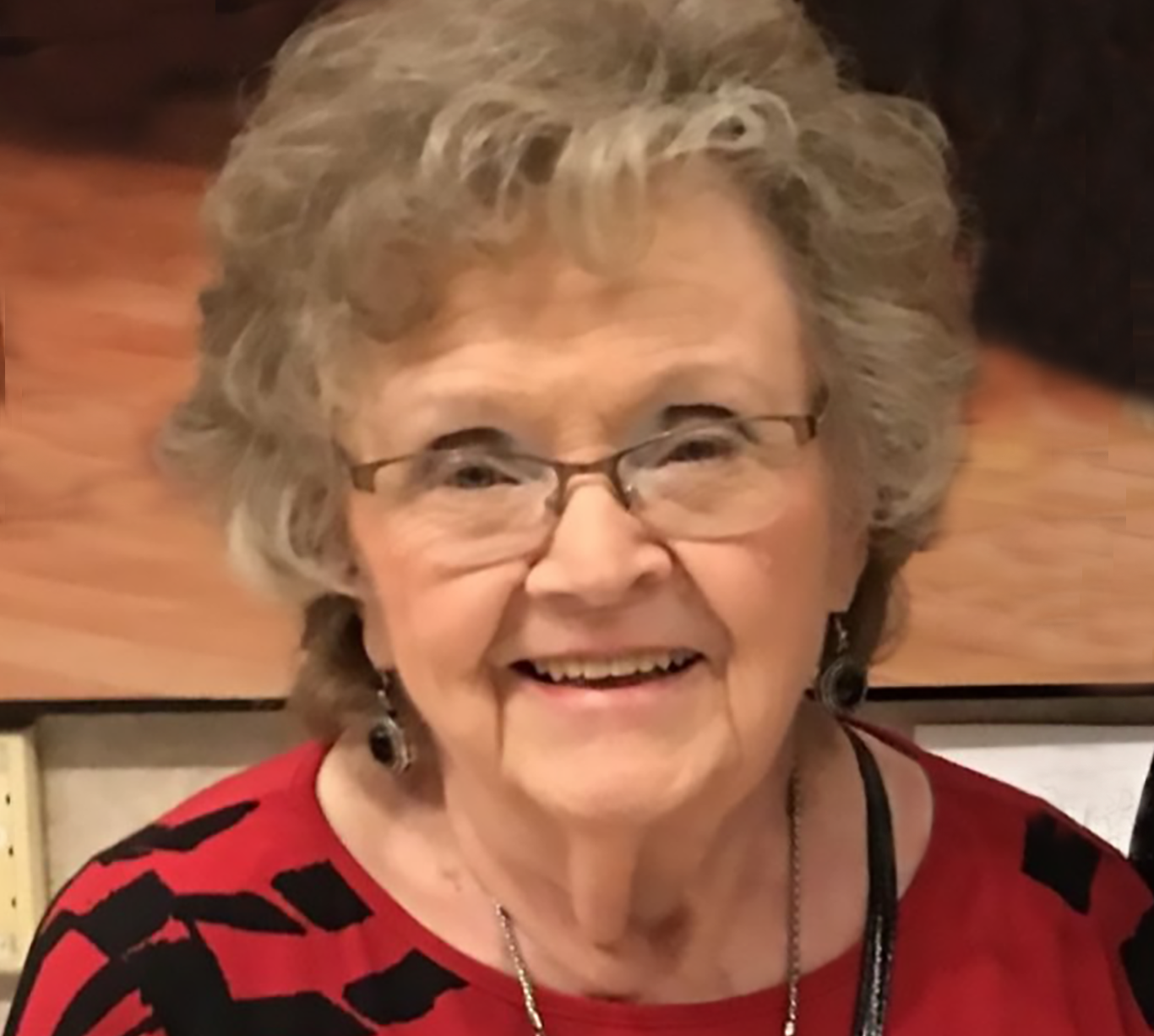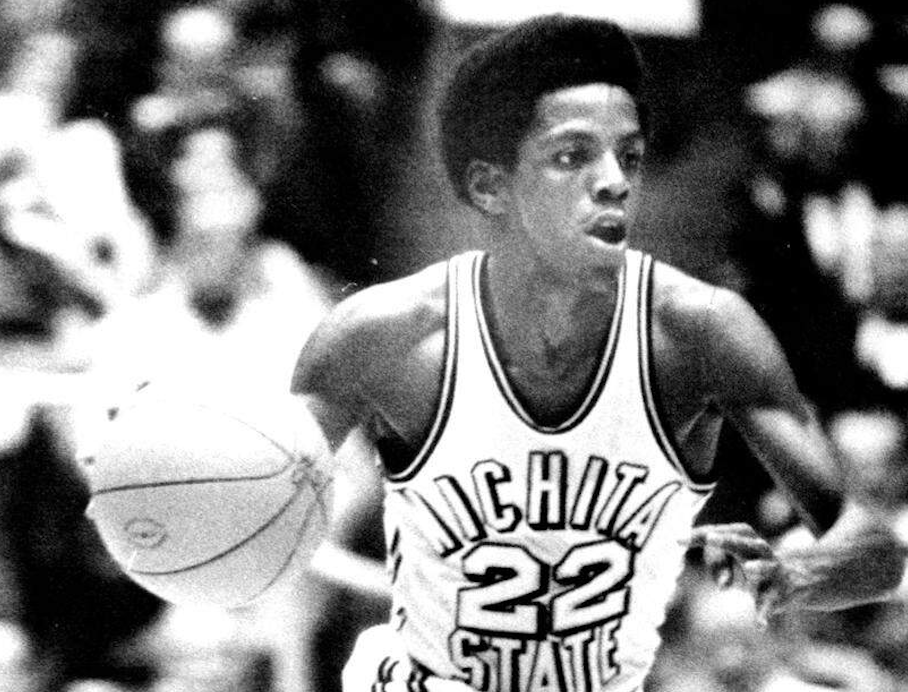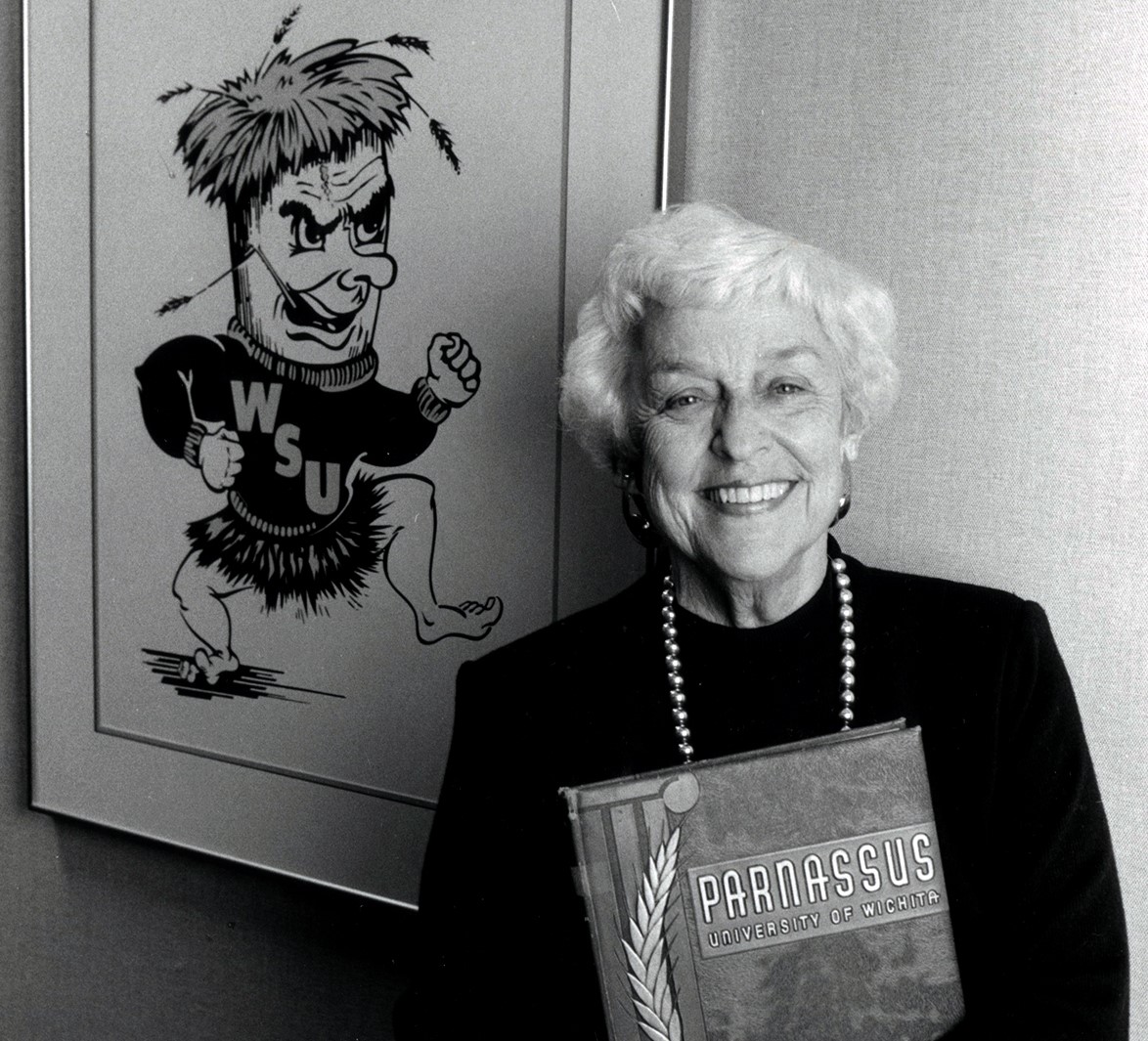Rhatigan: Student Centered
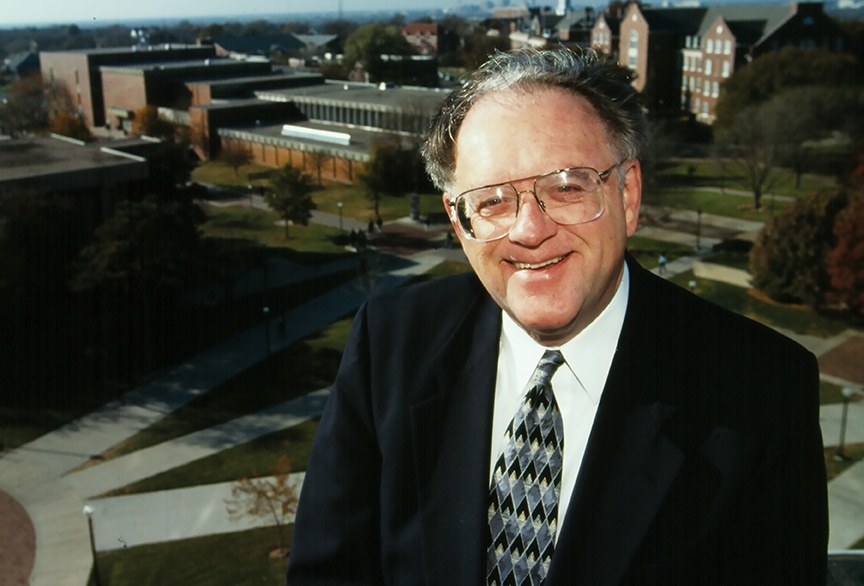
By Connie Kachel White
James J. Rhatigan came to Wichita State in 1965 as the university’s first and one of the nation’s youngest dean of students. He was 30 years old. He became vice president for student affairs in 1970, holding that position until 1996 and going on to serve as senior vice president until his retirement in 2002 – although he never did actually retire from his life’s work as advocate and ally of students seeking higher educations.
A national figure in educational activism, James J. Rhatigan, professor of education and senior vice president emeritus, served Wichita State for nearly six decades. Recruited in 1965 by then-WSU President Emory Lindquist to build a “modern division of student affairs,” Rhatigan went on to serve as WSU’s top student affairs administrator on the executive teams of three other presidents — Clark Ahlberg, Warren Armstrong and Eugene Hughes — for a combined 32 years.
In 1997, the year he stepped into his new role as senior vice president, he talked about his three decades at WSU. “My goal,” he said, “was to do everything prudently possible to remove the obstacles, clarify the issues and ameliorate any feelings that hindered students from achieving their goals — from obtaining their education.”
Renowned for his wit and wisdom, Rhatigan — an Iowa native who earned a bachelor’s degree in American history from Coe College, a master’s degree, also in American history, from Syracuse University and, in 1965, a doctorate in college student personnel administration from the University of Iowa — not only garnered scores of accolades and awards as a student affairs professional, he is — most appropriately — the namesake of the Rhatigan Student Center.
From 2002 to 2014, he continued his university advocacy as a consultant to the WSU Foundation (since 2022, the WSUFAE) and then went on to extend his tenure as an unpaid professional, working out of his campus WSUFAE office in the Woodman Center until just two weeks prior to his death Oct. 27, 2024.
A prolific and eloquent writer, he penned his thoughts about alma mater, “fostering mother,” for an address he gave in 1984. He approached the subject from a historical perspective, going back 600 years. Yet it didn’t take him long to zero in on the relational heart of the matter: “Alma mater is an anthropomorphic reference to higher education in which its creator apparently sensed and identified a phenomenon I feel is of profound importance. It implies a relationship between student and institution that is of inestimable value — deep and abiding.”
More recently, he wrote this: “Lives are changed on college campuses, this year and every year. Not every experience is positive but in their accumulation a higher education changes all of us. We know that when our life is changed others also are affected, in a growing circle of people who are integral to our life. Importantly, one never has to leave a campus because it is an idea, not merely a place. We can look backward from present circumstances that may be difficult and remember the best within us.”
Jim Rhatigan, whose influence at Wichita State runs so deep we can call him Alma Pater, will long be remembered as one of the very best among us.
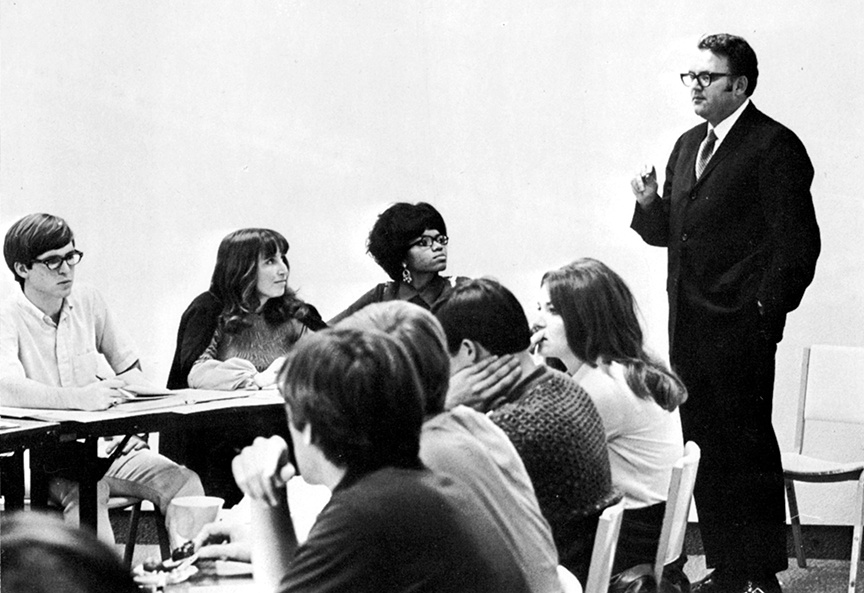
Dr. Rhatigan was an exemplar of integrity, compassion and principled leadership. His professional commitment to excellence in higher education and his ethic of caring for those he came in contact with, most especially students, were simply unparalleled. His influence here at Wichita State won’t be forgotten.
RICHARD MUMA
President, Wichita State University
Rhatigan: Our Memories
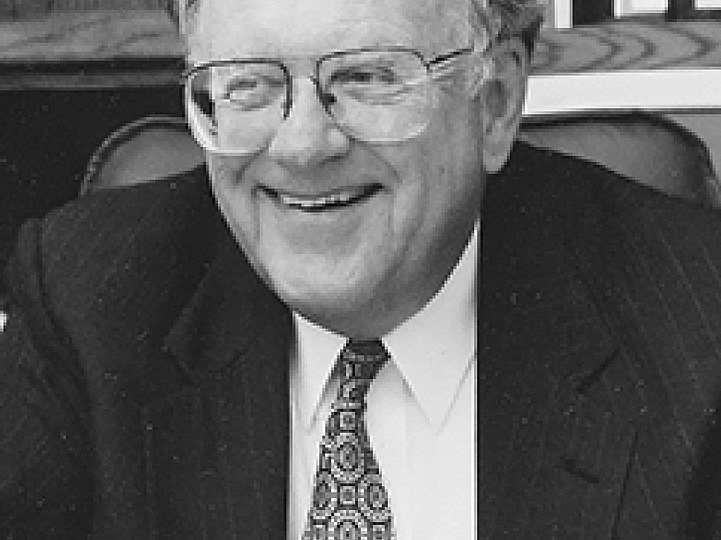
Remembrances of James Rhatigan through the years have poured in to the WSUFAE, including some that are posted below. To add your own memories of Dr. Rhatigan to this compilation, please email The Shocker editor at connie.white@wichita.edu.
From Michael Meacham ’74/98
Clemson, South Carolina
*Note: These remarks were made at Dr. Rhatigan’s memorial service Nov. 2, 2024, at the University Congregational Church in Wichita.
A young man from Western Kansas had been elected Student Government Association president; he was shy by nature; had grown up on a farm and, thus, not fully comfortable in urban settings. On this occasion, he was at the head table at an SGA banquet seated next to Jim Rhatigan. His general social reticence turned to trepidation when the main course was served: Fried Chicken! What to do?! Then he heard the warm, dulcet tones of Jim Rhatigan’s voice: “There’s really only one way to eat fried chicken.” Sure enough, Jim went for the chicken the way a good Iowa boy would.
All of us bring heartfelt stories and appreciation from those who could not make it back to Kansas today. I have had the pleasure of hearing from several former students. Among the countless student tributes and testimonials are these:
Was a father figure, an amazing person, a wonderful man, one of a kind, role model…
Provided timely advice, substantive encouragement…
He listened…
He was loved by the entire student body, and he loved us back…
On this occasion, it is my personal privilege to pass on the condolences from former international students like Saritha, Esam, Carolina and “all the Malaysian and Singaporean students who passed through the Halls of WSU” for whom the Dean was an “amazing man who will be greatly missed.”
We all have memories of Jim’s endless warmth, his graciousness, his keen insights and infinite capacity to teach. Dean Rhatigan is the most iconic figure of the university in its last half century. Jim was much more than an advocate for student interests – though he was tireless at that task. And he was much more than merely a reassuring voice at a banquet. During his service stretching across the tenure of five presidents in nearly six decades – he was the conscience of the institution, teaching and modeling student-centeredness in every conceivable forum. In the words of one former student leader, “You are a one-of-a-kind educator … You are simply the best.”
For me, he was not only an educator, but a friend, mentor and match-maker – he and Bev having introduced me to my future wife, his new associate dean, Dr. Vicky Triponey.
And, some of what he taught us, as provided by several student leaders and SGA presidents in various tributes follows:
The Ethic of Care for others and the community at large: As one student indicated, “While I was a resident assistant and a hall director, Dr. Rhatigan’s baseline requirements were paramount: residents must be safe, secure and made to feel a part of the WSU family. His expectations were high, and when I screwed up, he showed me how it was an opportunity to mature and grow. His professionalism, guidance and trust in my abilities during those years have remained with me throughout my life.
Civility: On the occasion of helping SGA negotiate with the Athletic Department regarding the appropriate allocation of basketball tickets for students, one leader remembered: “The point was that we actually experienced the give and take between parties holding different views on an issue. We saw that respectful exchanges of views and responsible compromises were the essence of a civil society.
How to diffuse a difficult situation He had a special gift to defuse almost any situation. On one occasion when some students were protesting the Vietnam War, they broke a window on the ROTC building. Jim was such an effective broker of ideas and values that he persuaded the students to take up a collection to pay for the window. (That may not be true, but it’s been urban legend for decades.)
One example that IS true: On at least one occasion, this talent for diffusing difficult situations and Jim’s determination to do it fairly caused him to do pretzel-like verbal contortions. That would be the time when a student group – the Erotic Arts Society – wanted a public screening of The Devil and Miss Jones along with Deep Throat. And, of course, it wasn’t just porn, it was political theater as the then Kansas Attorney General – running for Governor – decided to stop the showing. Jim addressed the throng of some 400 students and placated them sufficiently so that there was no further incident; the “boos” were directed elsewhere and the group broke up and departed (not entirely certain what was said, but convinced they defended free speech).
Integrity: As one student athlete said: “You were always a symbol of ethical behavior and your leadership inspired my leadership style in industry and academics… I looked up to you and you molded my character and leadership style.”
The Pipe: for those of us who grew up in a certain era, the Pipe was “a thing.” Jim’s pipe was both a prop and frequently used as a delaying tactic to manage the flow of discussion: a strategic device to defuse contentious issues. When asked a question, before answering Jim would tap his pipe on an ashtray, empty it, fill it with tobacco and tamp it down. All the while the listener’s attention was focused on the pipe while the sting, if any, of the answer dissipated with the silence.
The view that Jim shared regarding what it took to be a college dean, was down to earth. He once told a student leader there were three essential qualities necessary to be a successful dean. The quintessential dean, he said, should have a little gray hair at the temples; secondly, it is important to smoke a pipe. And the third thing…is a case of hemorrhoids.” He explained: Gray hair gives one a distinguished look; the pipe is essential to buy a few minutes on difficult questions. And with a broad grin he added, “and the hemorrhoids will give you that perpetually concerned look.”
But there was one quality, one lesson, one characteristic that best encapsulates our friend, Jim:
Appreciation of the Value of Personal Relationships: No story to go with this one. Look around the room. Each of us has been touched by one or more of Jim’s small kindnesses. His gifts were simple, but infinite: his time, his warm, engaging smile, his personal notes and, of course, his capacity to make anyone feel reassured in almost any situation. And he knew that, in kind, we would emulate and share those acts of kindness by caring for ourselves and for each other.
Dean Rhatigan was intentional about teaching with the power of joy and love, sending each of us into the world – not only to find our way – but to share joy and love with those in our respective worlds. He said in Simple Gifts, a 1994 speech to his professional association: “I take the view every good act lives on in history, experiencing countless combinations and permutations … Note the idea of love as responsibility, love as duty, love as obligation. When we see this kind of love, we see caring behavior… It is important that we find ways to convey the message of love with our brains engaged… A life lived of love and joy is not something we wait for, hoping it will happen, but is inside each of us looking for release, to the place just right.”
I will close with a Shaker hymn (also called Simple Gifts) Jim held dear to his heart, that captures so much of what he gave to all of us:
Simple Gifts
Tis the Gift to be Simple
Tis the Gift to be Free
Tis the Gift to Come Down
Where we Ought to Be
And When we Find Ourselves
In the Place Just Right
‘Twill be in the Valley of Love and Delight
I think we can agree that our friend Jim Rhatigan – the Dean of Deans – came down where he ought to be; in the place just right and I think we can agree that he now resides in the Valley of Love and Delight.
Amen
From Franklin Bósquez ’89
Panama City, Panama
It all started with a bicycle.
This is the best way I can summarize the beginning of a constructive relationship with Dr. James Rhatigan at Wichita State University, where I was accepted by the end of 1980, to continue my postgraduate studies. Between 1983 and 1987, I worked as chief of information at La Prensa (The Press), an independent newspaper in Panama that led a few social media outlets not affiliated with the military regime under general Manuel Noriega, who ruled Panama (1968-1989) with an iron fist.
In addition to my journalistic work, I taught part-time at the University of Panama’s College of Social Communication. At that time, President Abdiel Adames, along with my boss, Dean Hipólito Donoso, agreed that the military regime would close the newspaper sooner rather than later due to its unbearable “rosary of scandals,” which was consistently published by La Prensa. “Without your salary from the newspaper, you will not be able to support your family. What you earn at the university will not be enough,” Adames told me. Dean Donoso went further, concerned that “something ugly” could happen to me, such as imprisonment, or worse, an attack against my personal safety (justice at that time was subject to the totalitarian regime).
One morning, Adames summoned me to his office, informing me of an agreement that had been reached and signed with the Inter-American Development Bank (IDB). The agreement intended to send two promising young professors from each college to the United States to pursue their master’s degrees in different fields. In the 1980s, the University of Panama only offered bachelor’s degrees.
I immediately accepted the invitation, through which I was selected with no issues. Although eager for the invitation and ready to obtain my master’s degree, there were complications. One of which the scholarship would only cover the cost of the master’s degree, but not the English instruction. Since my knowledge of “Shakespeare’s” language was very poor, I was a little discouraged. However, I remembered an old Spanish saying: “sin luchas no hay victorias,” (without suffering, there are no victories). That is why I decided to sell my car and requested a loan of 10 thousand dollars from the Ifarhu (Institute for the Training and Use of Human Resources) in order to pay for my English instruction.
Furthermore, due to limited funds, the scholarship was strictly for “single” students. What about my wife and two children (nine and three years old)? I recall to another old Spanish saying, “donde come uno pueden comer cuatro” (where one can eat, four can eat as well).
In March 1987, I left for Wichita, the main city in the central state of Kansas, where I had already been admitted to the WSU Intensive English Language Center. My family and I agreed that they would travel later on until I’ve adjusted to the new environment.
Fortunately, at WSU I met a good number of Panamanians, whose ages ranged from 18 to 22; I was 33 years old. Since I didn’t have enough money to support myself, my countrymen recommended I should buy a bicycle. Since spring was approaching, it would be fabulous to get around the city most of the year. Of course, the bicycle had to be stored during the winter for obvious reasons.
Indeed, with some effort and savings, I bought my bicycle. A few days later, another complication; someone stole my bicycle. I had parked it with a padlock on the ground floor of the Fairmount Towers dorm. Frustrated and angry, I strongly wrote a worded note to the building manager who, I presume, handed it over to Dr. Rhatigan.
Dr. Rhatigan replied to my note, not only with elegance and appropriate language, but with forceful and irrefutable arguments. I felt like an idiot. In fact, I had not read the regulation: bicycles (or other artifacts) had to remain inside the rooms. Administration would not be responsible for any theft or damage. I understood that Wichita, like any other city in the world, also suffers from social problems, among which include criminal activities.
The next day, I went to Dr. Rhatigan’s office. I offered my apologies and promised that I would not write another letter under the influence of anger. Dr. Rhatigan liked my attitude. At his request, I began to explain the difficult political situation in Panama, not only as a country, but to me as well. This would spark a beautiful friendship between us.
No sooner said than done, in the middle of 1987, dictator Manuel Noriega closed La Prensa and other independent media. The following year, while beginning working on obtaining my master’s degree, the U.S. responded against Noriega and applied strong economic sanctions against Panama, which included the suspension of my scholarship payments by the IDB, whose headquarters are in Washington, DC.
With my scholarship suspended and savings close to zero, it was impossible to continue my studies. I went to Dr. Rhatigan’s office, explained my situation, and indicated that I did not have the resources to study or support my family. Dr. Rhatigan asked me to be patient and wait a couple of days, but he stressed that under no circumstances should I stop my studies.
Thereafter, I learned that, with the guidance of then WSU President, Dr. Warren Armstrong, Rhatigan showed off his skills and secured a donor (he still remains anonymous, despite my pleas) who facilitated the money to pay my tuition and other academic related expenses. For my part, I worked various jobs, such as gardener, waiter, painter, carpenter, etc., and received loans from relatives in the U.S. to care for my family. I cannot ignore the fact that the Catholic Church in Wichita gave me, on several occasions, coupons for purchases in supermarkets, not including liquor nor cigarettes.
After six months, President George Bush Sr. understood the suffering of many scholarship recipients and proceeded to lift the ban on many financial organizations, including the IDB. My family status returned to normal.
However, my graduation was approaching and I began to despair about what to do after receiving my degree. Returning to Panama, without a free media and with Noriega more malignant than ever, was outright suicide. I started pulling some strings, requesting political asylum, but the bureaucracy torpedoed my efforts. Once again, I turned to my guardian angel.
Dr. Rhatigan spoke with the WSU President, who had a close relationship with Kansas Senator Bob Dole, who was the Republican Majority Leader in the U.S. Senate.
Everything indicates that both Armstrong and Dole had a splendid conversation because the following day, I was contacted by the senator’s office in Wichita, where I went to sign a series of documents that were later forwarded to the Immigration office in Kansas City. Soon after, my family and I were granted political asylum. Within a few weeks, I started working in the public education system as a Spanish teacher; and my wife —a professional nurse in Panama— was taking her first steps as a nursing assistant in a private nursing home. With both salaries, we could already support our family with dignity.
On Dec. 20, 1989, the U.S. army invaded Panama and dismantled the Defense Forces led by Manuel Noriega. Democracy was reborn and Panamanians began to live in an environment of freedom. In January 1990, I went to Dr. Rhatigan’s office. As soon as I entered there, he told me, as if he were a clairvoyant, “I know that you and your family will return to Panama. Congratulations. You are an excellent Panamanian.”
So, it was. In June 1990, my wife, my children and I set foot on our Isthmus land. We left behind a wonderful experience with our almost four years of living in Wichita. But the connection to Rhatigan never dissipated. I have returned to Wichita three times and my first stop was always at Dr. Rhatigan’s office.
I am thankful that, on that occasion, someone stole my bicycle.
From John Bredfeldt ’69/71, Lt Col USAF, Retired
Dawsonville, Georgia
I had perhaps one of the most comprehensive experience with Dr. Rhatigan while at WSU than almost any other student. The reason I say this is that he and I arrived in 1965, he as Dean of Students and me, a freshman who lived in Brennan Hall men’s dormitory. I suspect that I am the only student in the history of WSU who lived in the Brennan Hall complex for six years. My first four years were as an undergraduate and the last two were as a graduate student. My exposure to Dr. Rhatigan grew each year — from hearing him talk to the freshman student body during freshmen orientation week the first year, to dealing with him occasionally as the president of Brennan Hall 1 my sophomore year, as a floor director my 3rd and 4th years, and then as the graduate resident of Brennan Hall 1 my 5th year and finally as the head resident of all three Brennan Halls (1 was all men, 2 and 3 were women’s dorms). As you can imagine, Dr. Rhatigan was both a mentor and a boss for five of my six years at WSU. Here are my personal remembrances of him.
My first observation of him was that he believed that a main concept of WSU’s existence was to protect the students from life-destroying harm whether within or outside the university. He believed that students who started as freshmen needed a broad, protected area to grow from physical safety, to ensuring the educational environment was teaching real, factual, useful thoughts, to helping each student grow to maturity that was both non-threatening and individually-paced. There were times when I thought his concept of a protective atmosphere for young adult maturity went too far. But I learned there was one other slice of U.S. culture that had a similar philosophy: the U.S. military. You see, upon completion of my master’s degree in economics in June of 1971, I entered the Air Force as a second lieutenant (having completed Air Force ROTC at WSU), where I quickly learned that the emphasis of maturing our young recruits was a major goal of basic training, and then in their early assignments in the Air Force. The difference was that now as an officer, green at the gills as I was, a major responsibility was to be a major part of that maturation process of our young airmen and airwomen. And, I am sure Dr. Rhatigan maintained that persistence in WSU providing each student a safe place for maturation for all his years there.
My second thought about Dr. Rhatigan was that he never raised his voice to a student in any discussion I ever heard between himself and an individual student, or a body of students. I believe every student who had fairly frequent or just occasional interaction with him never saw him red-faced angry. It was obvious to me that Dr. Rhatigan’s personal approach to people whoever they were was that speaking truth and frankness should be done quietly and peacefully for its best effect on the listener.
My third thought about Dr. Rhatigan was that he never let a bad situation, or a problem, no matter how serious go unattended. He was always quick to determine a next move to begin to quell the situation and did whatever had to be done to get the corrective action moving. During my last three years as a student leader at the Brennan Hall complex, we had some number of crises where I had to call him late at night or locate him during the day to tell him of a serious situation that had occurred. In every case, his first response was asking what action I had taken to handle the situation. Then he would provide his input on where to go from there. I do not ever remember him criticizing me for messing up a calamity. That simply was not his nature. Rather, he wanted to make sure we were moving forward from the place we were at at the time I contacted him.
Finally, in 2005, my wife, Jan, and I visited WSU for the first time since I had graduated in 1971. We first stopped at the Woodman Alumni Center so that I could find where convenient public parking places might be to walk through as much of the campus as possible. All of a sudden, I heard this unmistakably recognizable voice of Dr. Rhatigan boom from a room in the back, “Is that John Bredfeldt I hear out there?” He walked out of his office, called the golf course to get a four-seater golf cart and spent the entire afternoon from lunch time at Rhatigan Center until almost 5 p.m. taking us all over campus. It was one of the most memorable experiences of my life. I was 58 years old then, a retired Air Force lieutenant colonel with a Phd in economics and working as a contractor to the Air Force dealing with troubled equipment purchases. But, once again, in his presence, I was simply an individual facing a great man who had probably done more to shape my life than any other human being outside my parents. I no longer felt like a student, but I was in awe of a man who still sounded like my mentor.
To a significant degree, Jim Rhatigan was a pillar of WSU, the strong glue that kept the school’s life blood flowing. His presence will be missed by all who knew him. The tragedy is that many people who attend WSU in the future will not be touched by his magic.

